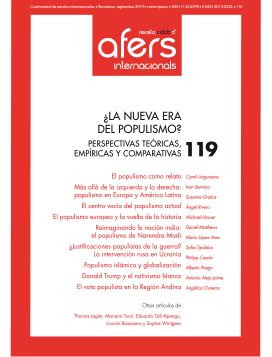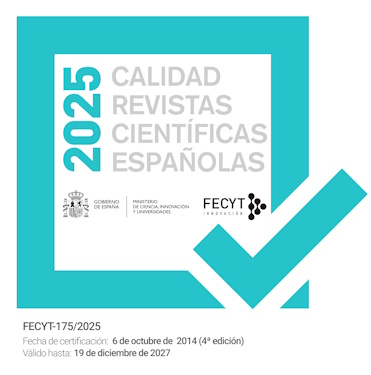Introducción: ¿la nueva era del populismo?
Resum
Revista CIDOB d’Afers Internacionals, nº 119
Cuatrimestral (mayo-septiembre 2018)
ISSN:1133-6595 | E-ISSN:2013-035X
DOI: doi.org/10.24241/rcai.2018.119.2.7
El «populismo» es, indudablemente, uno de los conceptos más controvertidos en la literatura académica de los últimos años y ha llegado incluso a ser moneda corriente en los debates políticos y los medios de comunicación (Laclau, 2005 y 2010; Mouffe y Errejón, 2015; Errejón y Serrano, 2011; Iglesias, 2015; Mudde y Rovira Kaltwasser, 2011; Müller, 2017; De la Torre, 2007; Fassin, 2018). Convertido, ciertamente, en un término no solo impreciso sino también sobresaturado en la esfera pública, el populismo se utiliza tanto para legitimar movimientos políticos que se presentan como la emanación de los intereses reales del pueblo como, a menudo, para descalificar indiscriminadamente al adversario. Así, en el caso español, por ejemplo, prácticamente todos los líderes y partidos políticos relevantes –Pablo Iglesias (Podemos), Pedro Sánchez (PSOE), Carles Puigdemont (Junts per Catalunya), Albert Rivera (Ciudadanos) o Pablo Casado (Partido Popular)– han sido calificados por turnos de «populistas».
Referències
Akkerman, Agnes; Mudde, Cass y Zaslove, Andrej. «How Populist Are the People? Measuring Populist Attitudes in Voters». Comparative Political Studies, vol. 47, n.º 9 (2014), p. 1.324-1.353 (en línea) https://doi.org/10.1177/0010414013512600
Albright, Magdalene. Fascism: A Warning. Nueva York: HarperCollins Publishers, 2018.
Brown, Wendy. Undoing the Demos. Neoliberalism’s Stealth Revolution. Cambridge, MA: Zone Books, 2015.
Brubaker, Rogers. «Between nationalism and civilizationism: the European populist moment in comparative perspective». Ethnic and Racial Studies, vol. 40, n.º 8 (2017a), p. 1.191-1.226 (en línea). https://doi.org/10.1080/01419870.2017.1294700
Brubaker, Rogers. «Why populism?». Theory and Society, vol. 46, n.º 5 (2017b), p. 357-385 (en línea) https://doi.org/10.1007/s11186-017-9301-7
Canovan, Margaret. Populism. Nueva York: Harcourt Brace Jovanovich, 1981.
Canovan, Margaret. «Two Strategies for the Study of Populism». Political Studies, vol. 30, n.º 4 (1982), p. 544–552 (en línea) https://doi.
org/10.1111/j.1467-9248.1982.tb00559.x
Canovan, Margaret. The people. Cambridge: Polity, 2005.
De la Torre, Carlos. «The resurgence of radical populism in Latin America». Constellations, vol. 14, n.º 3 (2007), p. 384-397.
Errejón, Íñigo y Serrano, Albert. Ahora es cuando, carajo! Del asalto a la transformación del Estado en Bolivia. Madrid: Viejo Topo, 2011.
Errejón, Íñigo; Mouffe, Chantal y Jones, Owen. Podemos: in the name of the people. Londres: Lawrence & Wishart, 2016.
Evans, J. Richard. «Dos intentos de explicar el auge del autoritarismo en el mundo y su comparación con los años treinta». eldiario.es (28 de julio de 2018) (en línea) https://www.eldiario.es/theguardian/fascismo-camino-libertad-advertencias-treinta_0_796170649.html
Fassin, Eric. Populism. Left and Right. Chicago: Prickly Paradigm Press, 2018.
Freeden, Michael. «Is Nationalism a Distinct Ideology?». Political Studies, vol. 46, n.º 4 (1998), p. 748-765 (en línea) https://doi.org/10.1111/1467-9248.00165
Iglesias, Pablo. «Understanding Podemos». New Left Review, n.º 93 (mayo-junio de 2015), p. 7-21 (en línea) https://newleftreview.org/II/93/pablo-iglesiasunderstanding-podemos
Ionescu, Ghita y Gellner, Ernesto. Populism: its meaning and national characteristics. Nueva York: Macmillan, 1969.
Krugman, Paul. «What’s the matter with Europe?». New York Times (21 de mayo de 2018) (en línea) https://www.nytimes.com/2018/05/21/opinion/europeeuro-democracy-wrong.html?rref=collection%2Fcolumn%2Fpaul-krugman
&action=click&contentCollection=opinion®ion=stream&module=stream_unit&version=latest&contentPlacement=3&pgtype=collection
Laclau, Ernesto. On populist reason. Londres: Verso, 2005.
Laclau, Ernesto. Nuevas reflexiones sobre la revolución de nuestro tiempo. Buenos Aires: Nueva Visión, 2010.
Mishra, Pankaj. «The Religion of Whiteness Becomes a Suicide Cult». New York Times, 30 de agosto de 2018 (en línea) https://www.nytimes.com/2018/08/30/opinion/race-politics-whiteness.html
Moffitt, Benjamin. The Global Rise of Populism. Performance, Political Style, and Representation. Stanford, CA: Stanford University Press, 2018.
Mouffe, Chantal y Errejón, Íñigo . Construir Pueblo. Barcelona: Icaria, 2015.
Mudde, Cass. «The populist zeitgeist». Government and Opposition, vol. 39, n.º 4 (2004), p. 541-563.
Mudde, Cass y Rovira Kaltwasser, Cristóbal. Populism in Europe and the Americas. Threat or Corrective for Democracy? New York: Cambridge University Press, 2011.
Mudde, Cass y Rovira Kaltwasser, Cristóbal. «Studying Populism in Comparative Perspective: Reflections on the Contemporary and Future Research Agenda». Comparative Political Studies (26 de julio de 2018).
Müller, Jan-Werner. What is populism? Cambrdge, MA; Londres: Penguin, 2017.
Piketty, Thomas. Capital in the xxi Century. Londres: Belknap Press, Harvard University Press, 2017.
Polanyi, Karl. The Great Transformation. The Political and Economic Origins of our Time. Beacon Press, 2001.
Reynié, Dominique. Les nouveaux populismes. París: Fayard, 2013.
Simeoni, Monica. Una democracia morbosa. Viejos y nuevos populismos. Madrid: Unión Editorial, 2015.
Snyder, Timothy. The Road to Unfreedom: Russia, Europe, America. Nueva York: Penguin Random House, 2018.
Stanley, Ben. «The thin ideology of populism». Journal of Political Ideologies vol. 13, n.º 1 (2008), p. 95-110.
Stokes, Bruce. «Populist views in Europe: It’s not just the economy». Pew Research Center (19 de julio de 2018) (en línea) http://www.pewresearch.org/facttank/2018/07/19/populist-views-in-europe-its-not-just-the-economy/
Taguieff, Pierre-Ahndre. «Political Science Confronts Populism: From a Conceptual Mirage to a Real Problem». Telos, n. º 103 (1995), p. 9-43 (en línea) https://doi.org/10.3817/0395103009
Ungureanu, Camil y Monti, Paolo. Contemporary Political Philosophy and Religion: between Public Reason and Pluralism. Londres: Routledge, 2018.
Vallespín, Fernando y Martínez-Bascuñán, Máriam. Populismos. Madrid: Alianza Editorial, 2017.













